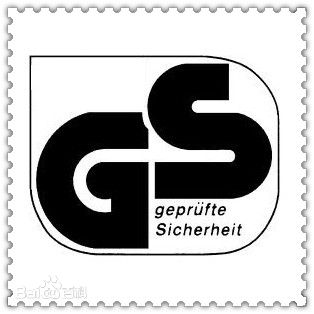GS means "geprufte Sicherheit" in German. It also means "German safety". GS certification is a voluntary certification based on the German product safety law (SGS) and according to the European Union unified standard EN or German industrial standard DIN. It is recognized as the German safety certification mark in the European market.
The GS logo indicates that the safety of the product has passed the test of an independent organization with credibility. GS mark, though not compulsory by law, can make the manufacturer subject to strict German (European) product safety law in case of accident caused by product failure. Therefore, GS logo is a powerful marketing tool, which can enhance customers' confidence and purchase desire. Although GS is a German standard, most European countries agree with it. And meet GS certification at the same time, the product will also meet the requirements of the European Community CE mark. Unlike CE, GS logo is not required by law. However, due to the safety awareness of ordinary consumers, an electrical appliance with GS logo may be more competitive than ordinary products in the market.
GS is a German voluntary safety sign; But it is highly valued by consumers. Many products, including power tools, information technology equipment and household appliances, can hardly be sold in or around Germany without GS logo.

Product evaluation, certification and pre license inspection
Product evaluation is based on harmonized European standards, referring to low voltage directive, EMC directive and machinery directive. If there is no relevant European standard for products meeting GS requirements, IEC standard certificate will be issued, and the validity period of the certificate is five years.
Pre license inspection is a necessary condition, followed by annual factory inspection.
In addition to the electrical safety specifications of European harmonized standards and German national deviations, the product evaluation should also be carried out in accordance with the ZEK document prepared by ZEK and the document prepared by the GS interpretation group EK1 (exchange of experience Forum 1). Some products also need to undergo ergonomic testing.
According to the ZEK 01-08 document, since April 1, 2008, products applying for GS certification must undergo PAHs assessment to meet the regulatory requirements and avoid health hazards. This mandatory requirement applies to all materials that may contain PAHs that may come into contact with human body or be put into the mouth under normal use or reasonable misuse. Products that have been certified by GS before April 1, 2008 need to complete PAHs assessment before March 31, 2009. ZEK 01.1-08, the revised version of ZEK 01-08, was published on June 25, 2008 and began to be implemented. The ergonomic testing required by GS in Germany covers a wide range of IT products, including LCD / CRT display devices, computers, notebook computers, and other computer peripheral devices (such as keyboard, mouse, printer, scanner, etc.), all of which shall comply with the relevant ergonomic specifications in ek1-itb2000 standard.
Products that can apply for GS certification include:
1. Household appliances, such as refrigerators, washing machines, kitchen appliances, etc.
2. Domestic machinery.
3. Sports goods.
5. Electrical and electronic office equipment, such as copier, fax machine, shredder, computer, printer, etc.
6. Industrial machinery, experimental measuring equipment.
7. Other safety related products such as bicycles, helmets, ladders, furniture, etc.
National hotline: 400-882-9628
Ms. Lao 17724720714
Email: Christina_ bst_ lab@163.com
Shenzhen headquarters: Beitong testing building, Chaomei Industrial Park, Donghaidao, Yantian Comprehensive Bonded Zone, Yantian District, Shenzhen
© 2021 Shenzhen Beitong Testing Co., Ltd(www.bst-iab.com)All Rights Reserved.